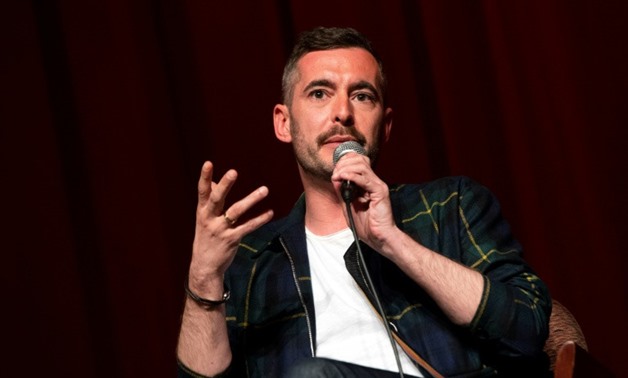
Actor/director Xavier Legrand talks about his thriller "Custody" during the Colcoa French Film Festival in West Hollywood-AFP / VALERIE MACON
29 April 2018: It is an unsatisfactory but all-too-familiar denouement of divorce battles involving children: the judge who must allow a violent man back into his family's lives because there is no proof of abuse claims.
Oscar-nominated Xavier Legrand's French-language thriller "Custody," an unsparing account of abuse focusing as much on the damage to the children, has earned acclaim at home and on the festivals circuit ahead its summer US release.
"I would like people to realize that domestic violence is a real scourge in our society and that children are also victims who are too often forgotten," Legrand, 40, told AFP during the COLCOA festival of French film in Los Angeles, which wraps on Monday.
"And especially that they understand that these kinds of situations can turn into horror. These are murders. Under no circumstances are these crimes of passion."
Over half of the killings of women in the United States are related to domestic violence, government figures show, with victims often dying at the hands of an ex who was granted shared custody of the children.
Last year the US Centers for Disease Control and Prevention analyzed around 10,000 murders of women in the decade from 2003, finding that more than half were perpetrated by a romantic partner or ex.
Data from Legrand's native France -- 123 women killed by domestic violence in 2016 -- demonstrate that the problem is not confined to the US.
The frightening reality of domestic violence runs counter to an idea perpetuated by Hollywood that the threat to women from men comes in the form of lunatic serial killers lurking in dark alleys.
With a few creditable exceptions -- among them "Tyrannosaur" (2011), "Once Were Warriors" (1995) or "Sleeping with the Enemy" (1991) -- spousal abuse hasn't been as captivating a subject for filmmakers as the much less common "stranger danger."
"Custody," which was written by Legrand, premiered at the Venice Film Festival last year, where it was awarded the Silver Lion for best direction and the Lion of the Future for best first feature film.
Lauded by the Los Angeles Times as a "masterclass in tension modulation and psychological entrapment," it is released on June 29 in the US.
Legrand's debut feature-length movie recounts the custody battle of the abused wife and a menacing husband first portrayed in his powerful Oscar-nominated 2013 short "Just Before Losing Everything."
Starting out as a nerve-jangling social drama, "Custody" simmers until it boils over into a full-blown, stomach-churning thriller, its pared-back screenplay aided by a conspicuous lack of music, a la Claude Chabrol or Alfred Hitchcock.
Lea Drucker and Denis Menochet reprise the roles they played in the short, while newcomer Thomas Gioria embodies the conflicting feelings and terrors of the couple's traumatized 12-year-old son.
Menochet, in particular, has been singled out by critics for his terrifying but nuanced portrayal of a man humiliated by allegations of abuse and driven by possessive rage.
Perhaps more impressive still was debut of Gioria, who convinced Legrand as soon as they met that he had the sensitivity, maturity and fragility -- not to mention courage -- that the role required.
"I started at the same age as Thomas. So I know that at that age, the mind is very clear about reality and fiction," said Legrand, an accomplished theater actor who studied at the National Academy of Dramatic Arts in Paris.
He was clear from the beginning that while the menace is ever-present, he wanted the violence itself to take place off screen, hidden from view as it is in real life.
The filmmaker met abuse victims, a judge, psychologists and police, and attended violent men's groups to prepare for the movie.
He always intended "Custody" to play out as a thriller, he says, rather than the type of social drama mastered by directors like Federico Fellini, Ken Loach or Mike Leigh.
"The stories that some women told me were really like thrillers," he told AFP. "That is the essence of this kind of situation. Fear is at the heart of domestic and family violence."


Comments
Leave a Comment